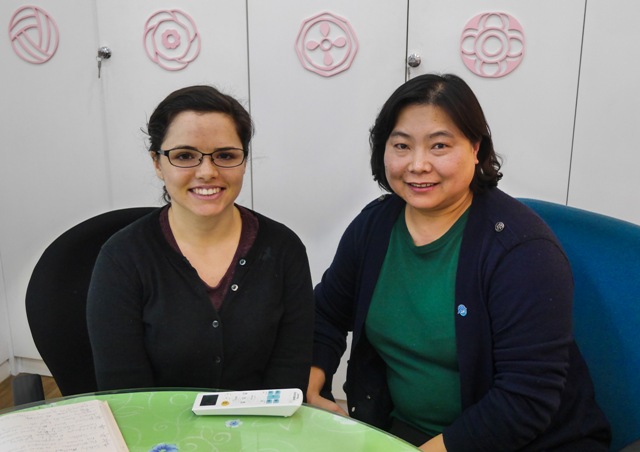| |
 |
|
| ▲ Koh Myung-hee talking with Ann Bush Photo Courtesy Yang Gayon |
Koh Myung-hee is an advocate for women, but you might as well call her a warrior.
As the head of the Jeju Association for Women's Rights (JAWR), she and her organization handles approximately 300-500 cases per year with a staff of only seven. Koh’s been fighting the good fight for 15 years now.
Jeju, it turns out, is the third worst region in South Korea for sexual assault and domestic violence - behind Gwangju and Seoul - with 2.03 women per 1000 on the island experiencing some form of violence every year. The national average is 1.7.
Koh said that some authorities think this is due to the fact that women report these problems more on Jeju than they do on the mainland. However, even at first glance such a suggestion is, at best, facile. There are clearly more substantive and troubling causes for these statistics.
Unfortunately, Koh explains, even though we know that Jeju suffers high levels of sexual and domestic violence due to prosecution rates, there aren’t any solid statistics on either specific types or motivations due to the difficult nature of gathering concrete data.
Victims are easily retraumatized by the very process of investigation, especially when not carried out by professionals who have had the necessary training.
| |
 |
|
| ▲ The JAWR building Photo Courtesy Ann Bush |
Koh suggests that at least one reason for Jeju’s high rate of violence towards women is due to the turnover rate on the island - millions of people visit Jeju every year.
Keeping track of who is coming and going is a logistical nightmare. It also pits law enforcement against tourism as a significant source of local revenue. This simultaneously stretches police resources thin and promotes a two-tiered system for dealing with crimes, differentiating tourists from locals, providing far more leniency to the former.
Beyond tourism, there are also issues of vulnerability amongst the foreign female population. Koh said most of her cases with women from other countries involve wives being assaulted by their Korean husbands.
Women from countries like the Philippines, Vietnam, and China who find it challenging to reach out for help due to language barriers and social isolation.
Furthermore, there are also women who are being taken advantage of by brokers who bring them to Korea illegally. In 2016, for instance, a group of ten Chinese women were allegedly brought to Jeju and threatened into being prostitutes.
Seven of these women were here illegally, and police questioned how this might have been used against them by the broker. People in a country illegally often fear reporting crimes since police are usually more interested in their visa status than the assault itself.
Koh believes that there is a robust connection between prostitution and sexual violence.
She offers the example of Gwacheon, where they banned brothels in the central district and installed more CCTVs throughout the streets in order to promote safety for women. These measures have caused a drastic reduction of reported sex crime - almost to zero.
Koh describes prostitution as a method for solidifying violence against women, encouraging men to objectify females.
| |
 |
|
| ▲ From humble offices comes stalwart assistance Photo Courtesy Ann Bush |
There is little doubt that sex industries bolster the myth that men are somehow entitled to intercourse, driven to “relieve their urges”. This perspective can and has been used to justify sexual assault - if a man doesn’t have enough money to buy sex, then it is acceptable for him to take it.
The JAWR has a threefold strategy to combat sexual and domestic violence: support, educate, and prevent.
The JAWR provides counseling resources to three kinds of victims: those of domestic violence, sexual assault, and members of the sex industry. The staff at JAWR are specially trained in these areas, so Koh recommends that a woman looking for help should go to the JAWR before talking to the police.
The JAWR also provides training programs and hosts community events throughout the year. In 2016, for instance, Koh conducted sensitivity training for the police department that included lectures and discussions with victims so they could give improved feedback to officers. She believes that such education programs can mitigate generalizations and shed light on the real experience of victims.
Lastly the JAWR performs village outreach programs that investigate community safety. They conducts pre-discussions with villagers in order to earn their trust, assuring them that the organization is not there to accuse or promote prejudice.
After ten years of such community outreach, Koh says she’s seen progress - especially with mothers and children over the course of the last two years. And she needs this kind of success.
When asked about how she manages to work with such heavy topics, Koh smiles and sighs. She admits it’s a hard job. Sometimes she feels run down and loses motivation.
It can be exciting too, however. She is energized watching the women she works with. She doesn’t see them as victims. She sees them as people overcoming. She watches her clients grow, and grows with them.
In the real world, heroic feats aren’t accomplished by superhumans, but by ordinary people like Koh Myoung-hee. She faces the toughest of issues every day, confronting the ugly things that no one else wants to deal with. We need more people like her.
| |
 |
|
| ▲ Talking about the issues that matter Photo Courtesy Ann Bush |
|























